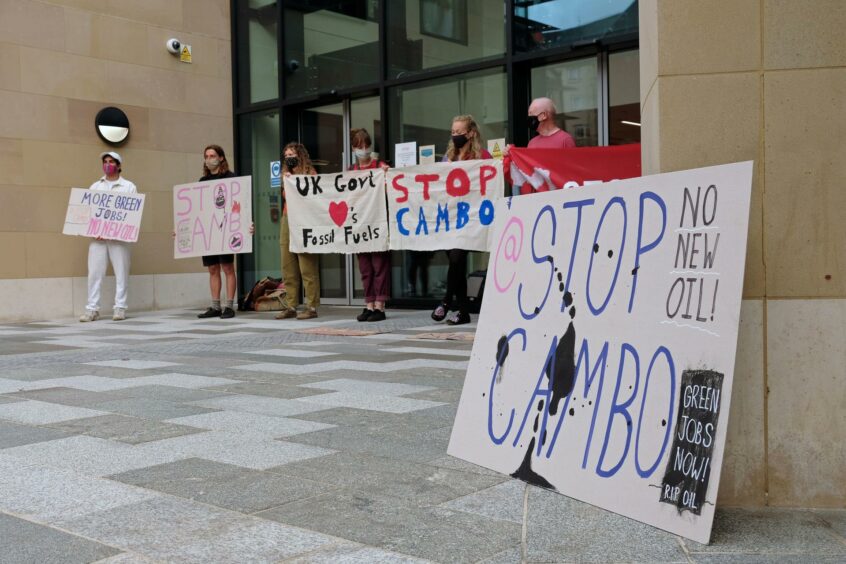 © Espen Mills / Greenpeace
© Espen Mills / Greenpeace Siccar Point Energy and Shell have been granted a two-year extension to the licences for the Cambo oil field, paving a potential future for the project.
The North Sea Transition Authority (NSTA) has awarded the extension to the development, with licences having been due to expire tomorrow.
In a statement, Siccar Point Energy said: “Siccar Point Energy and joint venture partner Shell have been awarded a 2-year licence extension for the Cambo field from the North Sea Transition Authority (formerly the Oil and Gas Authority).
“Siccar Point continues to work with its co-venturer Shell and the UK government to map out the next steps on Cambo.”
This month it was revealed that Shell (LON: SHEL) was “mapping out next steps” on Cambo, having decided in December not to move it forward to a final investment decision, citing the economics.
Shell said its position has not changed since December, but the extension of the licences provides time to consider its options.
A spokesperson said: “At this time there is no change to our position of December 2021, but the extension to the licences will allow time to evaluate all potential future options for the project.”
Industry analysts predicted that a licence extension was the most likely option for Siccar Point Energy and Shell, rather than relinquishment of their stakes or sales.
Shell holds a 30% stake in Cambo, which became a key battleground for climate campaigners during the COP26 climate conference in Glasgow.
Environmental activists claimed a “death blow” to the project in the wake of the decision not to invest.
However recent weeks have seen an increased focus on domestic oil and gas supply as the UK seeks to wean itself off from Russian supply following the invasion of Ukraine.
Cambo, in the West of Shetland, is targeting 175 million barrels of oil equivalent in its first phase, but subsequent stages would go after additional resources, according to the phase one Environmental Statement.
Keeping the field on ‘life support’
Environmental campaigners have condemned the NSTA’s decision to keep Cambo on the table.
Friends of the Earth Scotland said it “merely delays the inevitable rejection of the field” and the movement away from oil and gas.
Caroline Rance, a climate and energy campaigner with the organisation, said: “The UK Government is trying to keep this doomed oil field on life support but they are simply dragging out the inevitable rejection of Cambo and the transition away from fossil fuels. There is no safe future for new oil and gas production in the North Sea, Cambo and all new field developments must be rejected.
“Shell and Siccar Point Energy have had years to develop the case for opening the Cambo field, and have failed. Two more years won’t make the project look any better in terms of its devastating climate impacts or the urgency of the transition away from fossil fuels.”
Tessa Khan, director of Uplift and part of the Stop Cambo initiative, described it is a “scandal” that Westminster still backs new oil and gas fields.
She added: “With the government poised to launch its plan to secure an affordable energy supply for the UK, it’s now blindingly obvious that there is no public case for Cambo. It won’t lower our fuel bills, it won’t secure supply. This is oil for export, with the benefits – the enormous profits – going to Shell and SPE.
“What it will do is make it harder to stay within safe climate limits. And every new investment in oil and gas delays the UK’s move towards the cleaner, more affordable, more efficient energy system that the public needs and wants.”
Cambo will help to protect ‘energy security’
The NSTA said it does not comment on individual licensing decisions, but added that it will “proactively steward and then approve new projects while ensuring that North Sea operations are cleaner, and bolstering energy security and resilience.”
Trade body Offshore Energies UK (OEUK) welcomed the NSTA’s decision to grant an extension.
Mike Tholen, sustainability director at OEUK, said: “The UK relies on oil and gas for 75% of its total energy so it makes sense to produce as much of our own needs as we can, and as cleanly as we can.
“The global energy crisis triggered largely by the tragic events in Ukraine has shown us the importance of minimising reliance on imported energy.
“But at the moment UK gas and oil production is declining at about 15% a year which is much faster than the predicted reduction in UK energy demand.
“Last year the UK had to import 62% of its gas and this could reach 80% by 2030 – so investment in exploration, new fields and wells is important to protecting the UK’s future energy security whilst meeting our climate targets.”



